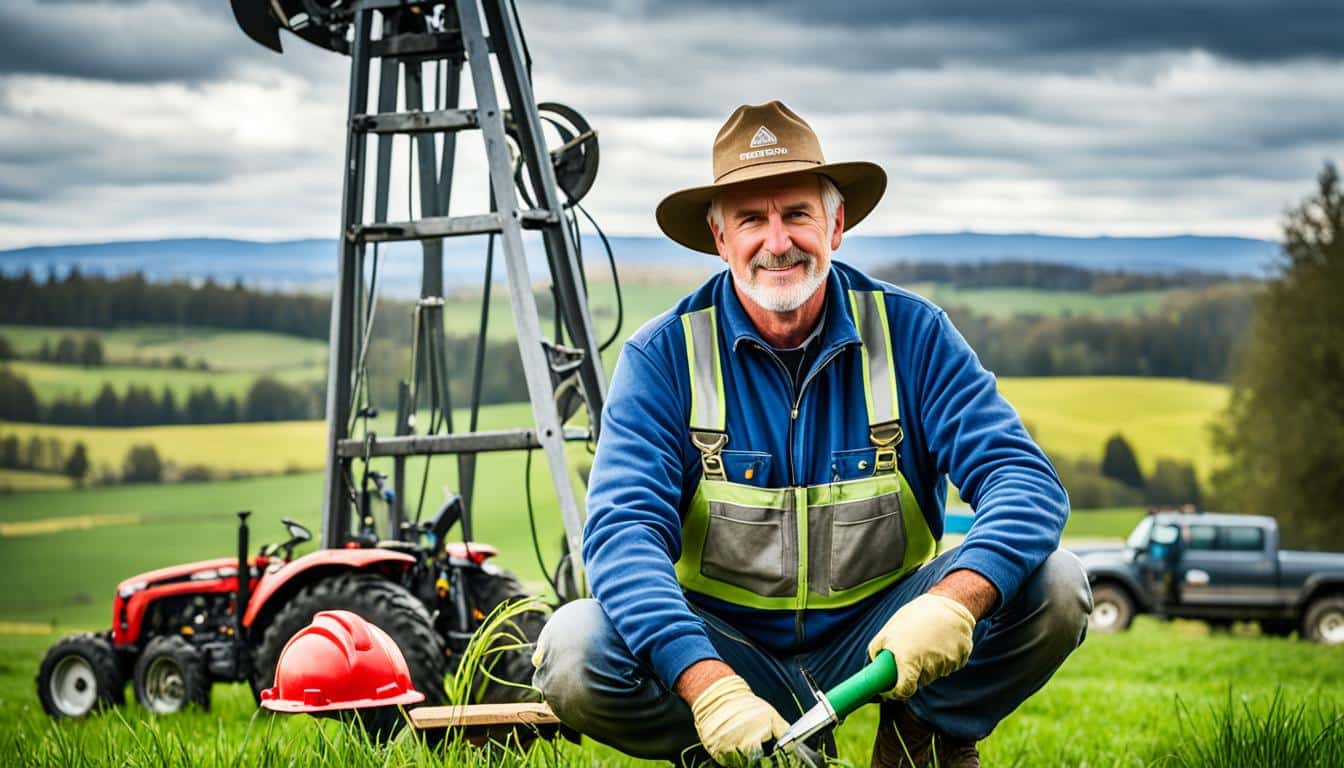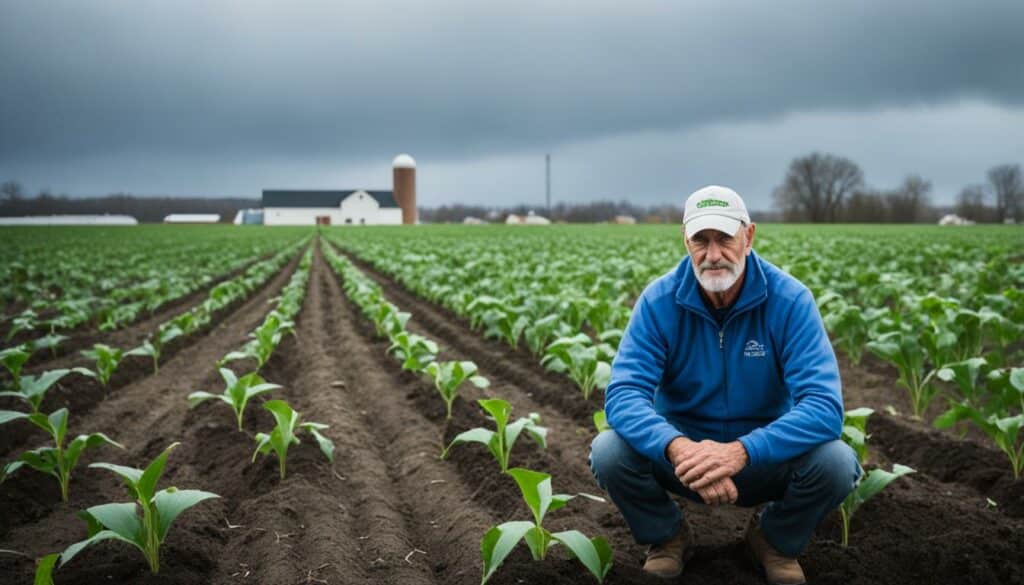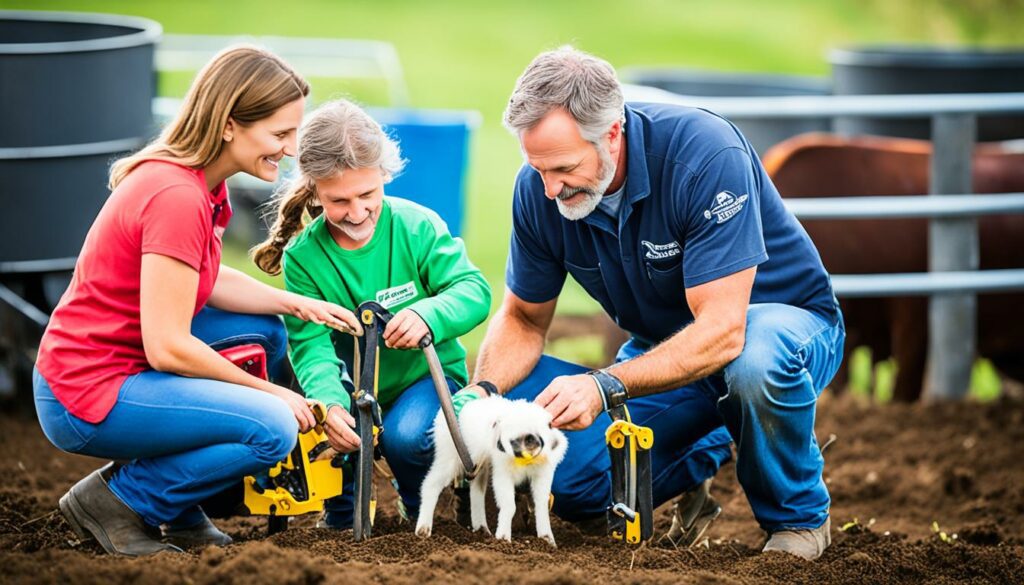Menu

Is the agricultural sector facing a mental health crisis? One that’s making farms less safe? Farm safety and mental health are closely connected, especially in farming’s tough world. Farmers have many unique stress points. These include changes in the economy, the weather, and feeling isolated. These stressors lead to higher levels of stress, anxiety, and depression. Sadly, statistics show that the rate of suicide among farmers in 2016 was much higher than in other jobs.
The 1980s saw a big rise in farmer suicides, pointing to a deep-rooted issue. Today, studies show that farmers and workers in farming face a higher risk of suicide. Rural areas, where farms are usually found, have more mental health problems than cities. Stress from farming can show up in the body as heart problems and stress.
Mental health is key at any stage of life, says the CDC. It affects how we make decisions, our relationships, working well, and handling stress. It’s crucial to deal with mental health issues in farming to keep everyone safe and well.
It’s vital to focus on mental health in farming for long-lasting, sustainable practices. Work pressures can cause a lot of stress, which is bad for both the person and farm safety. Good mental health makes the work setting positive, improves choices, and is crucial for managing a farm well. Mental health is just as important as physical health. It ensures farmers can work safely and well, despite the tough work.
Many farmers and farm workers face serious mental health issues. In 2016, the suicide rate was much higher among farmers and ranchers, at 43.2 per 100,000, than other working men, who had a rate of 27.4 per 100,000. This shows how hard mental health can be in agriculture.
In the 1980s, a crisis saw a big rise in farmer suicides. Today, we still see more suicides in farming than in other jobs. Studies from 2018 confirm this. Farming comes with unique mental health risks. So, it’s crucial we find ways to keep farm workers safe and well.
| Data/Year | Male Suicide Rate (per 100,000) |
|---|---|
| Farmers and Ranchers (2016) | 43.2 |
| Male Working-aged Adults (2016) | 27.4 |
| UK Agriculture (2019-20) | 133 individuals |
| Farmers in Scotland under 40 | 4 out of 5 consider mental health as the biggest problem |
Jobs like crop farming and animal rearing carry almost double the risk of national average for suicide. This shows we must work hard to lower this risk with better safety. Still, many farmers don’t seek help for mental issues, making things harder.
By focusing on both mental health and physical safety, farming can be a better, more productive place. We need farming methods that care for mental wellbeing too. This way, we create a space where farmers can do well, both mind and body, and work safely and productively.
Farmer mental health is a key issue, often pushed aside for the physical struggles of farming. Stress in farming comes from many sources, like money worries and being isolated. This kind of stress leads to feelings of depression and anxiety for many.

In 2016, the suicide rate for men in farming was 43.2 per 100,000 people. This is much higher than the average for all working men at 27.4. Such intense figures show the huge mental burden of farming on people. Sadly, the suicide rate for farmers is higher than any other job.
In one study, 60% of farm parents and their children showed signs of mild depression. This is very worrying. Farm kids, in particular, can have serious anxiety issues, with over 45% meeting the criteria for Generalized Anxiety Disorder. Factors like low income can make these issues worse.
Also, the mental health of parents and their teenage children is strongly linked. If a parent is feeling down, their child is likely to be struggling too. This connection points out the need to help the whole family, not just one person.
| Challenge | Adult Farmers | Farm Adolescents |
|---|---|---|
| Depression | 60% | 60% |
| Generalized Anxiety Disorder | 54.9% | 45.1% |
| Financial Stress Correlation | Low (r = 0.17 with financial situation, r = 0.27 with debt) | – |
We must fully understand the mental health challenges faced by farmers. Only then can we create support systems that really work. Tackling the intense pressures of farming is vital for the wellbeing of these communities.
When mental health like stress isn’t handled well, farm safety dangers grow. It’s crucial to manage stress in farming. This lowers the risk of accidents and boosts overall health.
Stress affects a farmer’s ability to make good choices. Financial stress, natural disasters, or a lack of workers can lead to bad decisions. Not paying attention to safety rules due to stress is dangerous for everyone.
Being able to focus on tasks and choose wisely is key. It helps lower safety risks on the farm.
Studies show that farmers often face mental health issues with limited professional help. This makes them more likely to have accidents.
Farming stress can have awful outcomes, like high suicide rates. Male farmers and ranchers had a suicide rate of 43.2 in 2016. This shows how deeply they can struggle.
Combine this stress with farm’s physical dangers, and it’s a deadly mix. To save lives, farms must work on safety with a focus on mental health and traditional safety methods.
| Occupational Group | Suicide Rate (per 100,000) | Mental Health Support Access |
|---|---|---|
| Farmers and Ranchers | 43.2 | Low |
| All Male Working Adults | 27.4 | Moderate |
So, dealing with mental health through good stress management is key for farm safety. Seeing and managing stress signs can cut down on accidents and deaths in farming.
Economic instability really hits farmers hard. Low prices for their goods and natural disasters add to their stress. So does the big debt some farms face. It’s vital we look at the whole picture of agribusiness economics to help.

Farmers deal with lots of problems that make their finances rocky. Changes in what they earn, not enough workers, and trade issues hurt their farm financial stability. In 2016, more farmers and ranchers took their own lives than others of a similar age but in different jobs. For them, we must do more to help them stay afloat financially.
| Country | Workplace Death % | Farm Sector % of Economy |
|---|---|---|
| United Kingdom | 24% | 1.5% |
A study by Yazd et al. (2019) found that money worries are a big reason farmers are feeling down. Berry et al. (2011) noted that bad weather also makes things worse. It too links to more stress and mental health troubles.
To make things better, we need a big plan. It must mix help for mental health with better ways to deal with money, moulded for the farming world. Otherwise, farmers’ mental health and the future of farming could be in danger.
Keeping health and safety in agriculture front and centre is crucial to avoid accidents. Safety on farms involves both body and mind. Strong safety rules and checking risks help cut down farm injuries.
A study from 2018 in the Journal of Rural Health found a big problem. The suicide rate is much higher for farmers than other jobs. This shows we need to support mental health to stop injuries. A poll by the American Farm Bureau Federation in 2021 says farmers are more open to talk about mental health. But, many still face shame when seeking help. It’s important to create ways for them to get mental health support.
Did you know one out of every five emergency room trips for farm workers is due to falls? And most of these lead to broken bones. This is why it’s critical to educate on how to work safely. Also, farmers must use the best safety gear possible.
| Study | Finding |
|---|---|
| Journal of Rural Health (2018) | Higher suicide rates among farmers compared to other professions |
| University of Iowa | Injury death rates in crop production are higher than in animal production (15.9 vs. 10.8 per 100,000 workers) |
| American Farm Bureau Federation (2021) | Stigma remains a significant barrier to mental health treatment |
The Great Plains Center for Agricultural Health (GPCAH) offers help too. They provide tools and guides that farm workers and owners can use to stay safe. Their work is important for farm risk management. It helps communities be ready to face health challenges. This leads to fewer injuries in farms.
Rural isolation affects farmers’ mental health, leading to more depression and anxiety. A quarter of all work deaths in the UK farming sector shows the close link between mental health and safety. Sadly, farmers see higher suicide rates due to loneliness than other rural men.

Economic struggles make things worse. Farm incomes dropped dramatically, making finances hard. This and the fact that few farmers can solely make a living from farming increase stress and isolation. This leads to serious mental health problems.
Many young farmers in Scotland see mental health as their biggest challenge. The isolation and lack of support hit them hard. Depression is common and affects older men more, who often don’t ask for help.
Efforts to improve rural mental health are crucial. Creating support and social programs can reduce isolation and its impacts.
There’s a big problem with social support for farmers. After 1989, when gun laws got stricter, suicides by hanging became more common. This change shows a big gap in the support systems, something we need to urgently fix.
Creating strong support systems within farming communities is key. Counselling and support groups help. Rural mental health initiatives say these efforts not only improve mental health but also strengthen the community.
In conclusion, we need a mix of support for farmers. This includes economic help, mental health support, and building social networks. By doing so, we can boost farmers’ mental health and make farm works safer.
The link between mental health and farm safety is very strong. The farming sector has a high death rate, causing 24% of all workplace deaths. This is despite making up only 1.5% of the British economy. It’s crucial to focus on farmer wellbeing due to the unique challenges they face.
In 2019-20, 133 people in agriculture in the UK took their own lives. Farming sees more suicides than the national and rural male averages. This includes roles like crop harvesting and animal rearing, which have twice the risk of suicide. These figures stress the urgent need to address how mental health affects farm safety.
Stress factors like money problems, climate change, long hours, and loneliness add to mental health issues. In Scotland, four out of five farmers under 40 see mental health as the top issue. They think about their life’s worth, with those owning smaller farms facing more stress and less support.
The drop in farm incomes and rising debts worsen mental health too. For example, by 2000/2001, a 500-hectare farm’s average income fell from £80,000 to £2,500. This economic pressure is tied to mental health problems and farm safety, risking more accidents.
Supporting mental health among farmers is key to making farms safer. They often don’t seek help for mental problems. Promoting good sleep, food, and exercise can help. Programmes like the Farmer Wellness Initiative, which offers mental health support, are crucial for farmer wellbeing and safety.
A work setting that looks at mental health and safety leads to better focus and safer practices. It’s clear that mental health affects farm safety. Taking a comprehensive approach boosts farmer health and safety practises.
Strong farm safety measures are crucial for the well-being of farmers. If families and communities get involved, they can help deal with mental health challenges. Farming comes with a lot of pressures that can harm mental health. So, having support from family and the community is very necessary.

Family support is key for farmers. It helps them cope with the stress of their work. Mental health issues are common in farming areas. A strong family support network reduces depression and anxiety.
This support helps farmers stay mentally strong and healthy. Family plays an important role in keeping farms safe. They look out for each other, spotting mental health signs early. This prevents any issues from getting worse.
Communities also play a big part in supporting farmers. They organise programs that meet farmers’ needs. These can include workshops and mental health training. They also set up support groups.
These initiatives link farmers and health professionals. They tackle common issues like stress and sleep problems. They also work on preventing suicide.
The data proves how these networks are vital:
| Statistic | Details |
|---|---|
| Male suicide rate among farmers and ranchers | 43.2 per 100,000 (2016) |
| Comparative male working age adult suicide rate | 27.4 per 100,000 (all occupations) |
| Mental illness prevalence | Higher in rural areas compared to urban areas |
| Health conditions related to stress | High rates of heart disease and hypertension among agricultural workers |
Life as a farmer can be stressful, but family and community can provide support. With their help, we can make farming communities healthier and safer.
Farmers need mental health support that’s easy to get and designed just for them. With male farmers’ suicide rates at 43.2 per 100,000 in 2016, this issue is critical.
It’s hard to fit farm work into health data, but studies often show that farmers face more mental health problems. So, having good mental health help is very important.
Problems like low prices and high debts make mental health worse for farmers. They can cause stress, worry, and sadness. That’s why mental health help for farmers should include ways to manage money. The University of Minnesota Extension has great resources for farming families about stress and mental health.
AgriStress Helpline is available for instant help in places like Colorado, Oregon, and Pennsylvania. The SAMHSA Helpline is also there to connect farmers with the mental health help they need.
We need to fight the idea that asking for mental help is bad. Making mental health a priority can improve farming and communities. Encouraging good mental health helps everyone.
It’s vital to talk about rural mental health support to help people in the countryside. Rural areas see more mental health issues than cities. This is due to being far from help, feeling alone, and the tough life of farming.
The need for such support is clear from numbers showing higher suicide rates among farmers. For example, in 2016, there were more suicides among male farmers than male workers in other jobs.
For mental health programs to work in rural settings, they must be designed with the countryside in mind. Social support is especially important. It helps fight off the loneliness many farmers feel.
By creating projects within the community, farmers can find help and support. A lot of farmers suffer from stress and sadness. They need focused help to get better.

Special programmes like the National Strategy for Suicide Prevention are important. They set out many ways to reduce suicides in farming areas. These efforts should include checking how well the help is working and making changes to improve it.
Another key to helping farmers is talking to them directly. By understanding their challenges, programmes can be more useful. For instance, there’s a study that looks at what causes stress in female farmers. It shows that different factors are linked to stress, like their farm’s size and if they work off the farm.
| Category | Rate/Percentage |
|---|---|
| Male Suicide Rate among Farmers (2016) | 43.2 per 100,000 |
| General Male Working-Aged Suicide Rate | 27.4 per 100,000 |
| Stress, Anxiety, and Depression among Farmers | 55.4% |
| High Psychological Distress (Australian Farmers) | 57.1% |
| Depressive Symptoms (Cash Grain Farmers, Ohio) | 1.3% |
| Perceived Stress (Cash Grain Farmers, Ohio) | 1.7% |
| Depressive Symptoms (Farmers, Iowa) | 9.2% |
| Depressive Symptoms (Farmers, Colorado) | 10.1% |
To sum up, creating mental health initiatives specifically for rural life is very important. These programmes, based on solid information and customised for rural areas, can really help. They are a crucial part of making life better for farmers and making communities stronger.
In today’s world, technology is changing farming for the better. It brings great benefits, but also new challenges.
Digitalisation in farming is happening fast. It brings both good and bad. New tech like precision farming helps a lot, but it’s hard to learn.
Smart farming means using new tools to grow crops better. But it takes time to get good at it. This can be stressful for farmers.
Technostress is a big issue in farming today. It’s the worry from always needing to keep up with technology. For some, it’s hard to balance tech with farm work, leading to stress.
To fight technostress, help and training are crucial. Here are some things that can help:
By handling technostress well, farmers can use tech better. This makes technology a help, not a worry.
| Issue | Significance |
|---|---|
| Male suicide rate in farming (2016) | 43.2 per 100,000 compared to 27.4 per 100,000 in other occupations |
| Mental illness prevalence | More common in rural than urban areas |
| Impact of stress on health | Leads to insomnia, depression, anxiety disorders |
| Farmers’ risk of mental health conditions | Among the highest compared to other occupations |
Technologies can make farming better. But, we must also take care of farmers’ mental health. This will make them work better and be happier.
Natural disasters hit farmers hard, wrecking their crops and lives with unpredictable weather. This leads to serious mental health problems. Sadly, many farmers don’t have enough help to deal with these issues.
The climate crisis farm impact leads to more and worse natural disasters. This causes big money troubles for farmers. It also makes mental health problems like stress, depression, and anxiety even worse.
In the 1980s, a lot more farmers started taking their lives because of all the challenges. Now, problems from natural disasters add to their stress. Mental illness is more common in the countryside, which shows we need to focus on mental health support for farmers.
Providing mental health help is as important as physical recovery after disasters. For example, after Hurricane Irma, mental health training was given to many farm workers. It’s vital to keep offering mental health support and find the best ways to help farmers.
The mental health impact of natural disasters in farming is tough. But, we can help farmers cope better and stay healthier with the right care and support.
The stigma around mental health is a big issue in farming. Many farmers don’t get help because they think it’s weak to admit they’re struggling. This idea is linked to old beliefs about being a man. To help, we need to change these ideas and make a supportive space.
In 2016, farm and ranch men’s suicide rate was much higher than other working men. This shows we urgently need to raise awareness about mental health in farms. Small things like not knowing if you’ll make money, feeling alone, and a tough job are big factors in this crisis.

The 1980s Farm Crisis showed us the danger of ignoring mental health. Back then, the number of farmer suicides went up a lot. Today, farmers are still under a huge amount of stress. One big problem is there are not enough mental health professionals where they work.
To fight this problem, we need mental health awareness in agriculture efforts like the Mind Your Head Campaign. These campaigns make talking about mental health normal. They show farmers it’s OK to ask for help and let everyone know what farmers go through.
Getting rid of the stigma needs many plans. We must encourage honest talks, make getting help easier, and get support from groups like the Farming Community Network (FCN). The goal is to make farmers feel they can talk about their feelings without being judged.
To sum up, beating mental health stigma in farming is a must, not just an option. By spreading awareness and questioning old beliefs, we can help farming communities be stronger and kinder. This change is key in stop caring more for our farm workers.
Teaching farmers about mental health is crucial. It helps keep them safe and healthy. Farmers often face mental health problems. They have higher risks of depression and anxiety, with some even thinking about suicide.
Knowing the signs of mental health issues early is key. This knowledge can lead to better support. By teaching farmers, we can help them get help sooner. This lowers the chances of conditions worsening.
Farming safety training should cover physical and mental health. In the past, training only looked at how to be safe with tools and animals. Now, we should add mental health to this. Farmers deal with a lot of stress from money worries, the weather, and working alone. This stress can affect their decisions and make accidents more likely.
Adding mental health support to farming can make a big difference. We need to give farmers ways to be mentally strong. This includes teaching them how to handle stress and worry. Plus, we should offer access to counsellors. This way, farmers can get help with the pressures of their job.
Here are some important facts that show why mental health education is so needed for farmers:
| Mental Health Issue | Impact on Farmers |
|---|---|
| Suicide Rates | 43.2 per 100,000 (farmers) vs. 27.4 per 100,000 (all occupations) |
| Stress-Related Conditions | High rates of heart disease, hypertension |
| Long-Term Stress Symptoms | Irritability, headaches, trouble sleeping, heart disease, diabetes |
| Depression | Common, with symptoms like sadness, anxiety, irritability |
| Anxiety Disorders | Interference with social relationships, concentration, and sleep |
Teaching farmers about mental health has a big impact. It combines safety training with a focus on staying mentally well. This makes the whole farming community healthier and safer. Recognising and tackling mental health problems is essential for farming to be sustainable and to offer a caring workplace.
Farmer mental wellbeing is very important, especially because mental health problems are common in the countryside. Mental health hotlines and support networks offer crucial help to those who need it.
National hotlines are key in providing quick mental health support to farmers. The National Suicide Prevention Lifeline (1-800-273-TALK) and Crisis Text Line (text “CONNECT” to 741741) are vital resources. They provide private support and link people to professional help.

Depression and Bipolar Support Alliance (DBSA) and the Anxiety and Depression Association of America (ADAA) give extensive help to those with mood issues. SAMHSA and Purdue Extension work on substance abuse and opioid misuse in farming areas.
Local support networks offer long-term help and care to farmers. The Iowa State University Extension Agency provides stress management tips and farm safety advice. National AgrAbility’s webinars teach stress management and rural opioid crisis awareness.
Mental Health America has online stress checks and tools like CES-D and MAST. Also, Mental Health First Aid and Generation Rx help connect with mental health agencies locally. This ensures farmers get complete care.
| Resource | Description |
|---|---|
| National Suicide Prevention Lifeline | Confidential crisis support and connection to local resources |
| Depression and Bipolar Support Alliance (DBSA) | Support and education for individuals with mood disorders |
| Mental Health America | Online screenings and resources for mental health awareness |
| Iowa State University Extension Agency | Resources on stress management and farm safety |
| National AgrAbility | Webinars on stress management and the opioid crisis |
In recent years, many effective mental health interventions have helped farmers worldwide. These initiatives specially target farmers dealing with psychological issues. They offer insights into what works and how to support farmers better globally.
In Ohio, USA, a project helped 1.3% of cash grain farmers facing depression and stress. This programme offered counselling and support, which significantly lowered their distress. Canadian farmers found help through mental health training and workshops. These initiatives reduced anxiety and depression rates. They show that ongoing support is vital.
Scotland faces a significant mental health challenge among young farmers. Community groups and awareness campaigns have made a big difference there. In India, a crisis led to farmer suicides. Programs offering financial and psychological support have started to lower these sad statistics. In England and Wales, engaging communities and mental health training has helped farmers’ emotional well-being.
| Location | Intervention | Outcome |
|---|---|---|
| Ohio, USA | Counselling and support services | Reduced depression and stress |
| Canada | Resilience workshops | Mitigated anxiety and depression |
| Scotland, UK | Community support groups | Improved mental health awareness |
| India | Financial and psychological support | Reduced suicide rates |
| England and Wales | Mental health training | Enhanced emotional wellbeing |
These stories from around the world highlight the need for specific mental health interventions in farming. Sharing and learning from these projects helps us support farmers better. It allows us to develop ways to deal with the unique mental health challenges they face.
Mental health is very important for farm safety and wellness of farmers. Although farming makes up only 1.5% of the British economy, it sees 24% of workplace deaths. This shows the urgent need for better mental health support in this sector.
Farmers often face high stress because of money worries and being isolated. This stress is making mental health issues worse, leading to a worrying number of suicides. Those who work with crops and animals are especially at risk.
To make farms safer and help farmer’s mental health, we must deal with the specific things that stress them. Young farmers in Scotland, especially, are struggling the most. They say mental health is their top challenge.
They also face added pressure from having easy access to guns and tough economic times. We need to help them by improving mental health education, support from family and friends, and by making mental health help easy to get to.
Focusing on mental health in farming will help create tough, healthy farmers. It’s important to see mental health as key to keeping farms safe. We must encourage honest talks about mental health to break the silence.
Working together is the best way to look after our farms and farmers. Governments, farming groups, mental health experts, and local people all need to join forces. Together, we can make sure farming stays safe and strong.
Poor mental health makes it harder to make safe decisions. This can lead to more accidents and serious injuries on farms. Things like stress, anxiety, and depression can make someone less focused or likely to make bad choices. This directly affects how safe people are when working on a farm.
Farmers often feel a lot of stress, depression, and anxiety. This is because of the pressure to make money, feeling alone, and how much work farming involves. These problems can really wear down someone’s mental health. Sadly, it can even lead to more farmers taking their own lives.
Having good mental health is key to farming well over time. It helps create a happy work space and can lead to better decisions. Also, it means farmers can do their work safely and with skill.
Many things like changing prices for crops, natural disasters, and money problems can really get farmers down. These issues, like with COVID-19, can add up to a lot of anxiety and stress.
Living far from others can make mental health problems worse for farmers. Because it can make them feel really alone and like they don’t have anyone to turn to. But efforts to improve mental health in the countryside and build strong support groups can help a lot.
To prevent farm accidents, you need to think about both the body and the mind. This means having clear safety rules, ways to spot dangers before they happen, strategies to stop injuries, and ways to help people’s mental health. All of these things together make farms a safer place to work.
Family and community support is like a lifeline for farmers’ feelings. When communities and families come together to help, it makes a big difference. Local programmes and activities are also vital, as they can provide help and hope for those dealing with poor mental health.
Farmers have lots of places to turn to for help. This includes national hotlines like Farm Aid Hotline and the 988 Suicide and Crisis Lifeline. There are also local networks that connect farmers with specific help in their area.
Natural disasters can be very tough on farmers. They can destroy crops, animals, and people’s jobs. It’s important to help farmers find ways to cope and support their mental health. This is key in helping them navigate through hard times caused by things like bad weather.
Training on mental health teaches farmers what to look for and how to help. By adding this to the usual safety training, it’s easier for everyone to notice and deal with mental stress. This makes life better for the entire farming community.
New farm tech can make things easier but also cause stress. Farmers are learning new digital systems which can be overwhelming. Handling this stress and making sure farmers have the right support for technology can make a big difference.
Mental health remains a sensitive issue in farming, stopping some from getting help. Talking more about mental health and teaching the farming world can change this. It’s important for creating a caring culture for those who need support.
Yes, many success stories in mental health support come from farms globally. These include getting everyone in the community involved in understanding mental health, having special training programmes, and making information easily available for farmers. These examples show what works and can help guide future efforts.